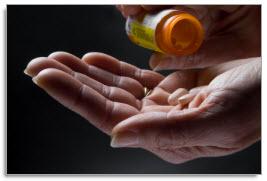Beta-blockers, which include Inderal (propranolol), Toprol (metoprolol) and Tenormin (atenolol) among others, have been used in general medicine since 1965. These drugs block beta- receptors in the heart, and by doing so, blood pressure, heart rate and cardiac output are decreased. This led to beta-blocker use in the treatment of hypertension, angina and cardiac arrhythmias.
 In psychiatry, beta-blockers are used in the treatment of anxiety disorders with manifestations such as palpitations, sweating and tremor. As such, performance anxiety that may affect public speakers, musicians or those taking an examination seem to be well suited for beta-blocker treatment. These medications may be taken as needed approximately one to two hours prior to a stressful event. When use is carefully monitored, side effects are generally mild and include weakness, tiredness and possibly bradycardia (slowed heart rate).
In psychiatry, beta-blockers are used in the treatment of anxiety disorders with manifestations such as palpitations, sweating and tremor. As such, performance anxiety that may affect public speakers, musicians or those taking an examination seem to be well suited for beta-blocker treatment. These medications may be taken as needed approximately one to two hours prior to a stressful event. When use is carefully monitored, side effects are generally mild and include weakness, tiredness and possibly bradycardia (slowed heart rate).
It is important to note that beta-blocker use for performance anxiety will assist in curbing only the peripheral manifestations of anxiety noted above. The internal sensations of anxiety exacerbated by the fight-or-flight response typically do not respond to this medication class. Beta-blockers are contraindicated in patients with asthma, emphysema and other respiratory diseases. Incidental use of Inderal (propranolol) for performance anxiety is usually in a dosage range of 10 mg to 60 mg, one to two hours prior to the stress-related event. Long-acting Toprol XL can be dosed as low as 25mg with favorable results.





Leave A Comment
You must be logged in to post a comment.